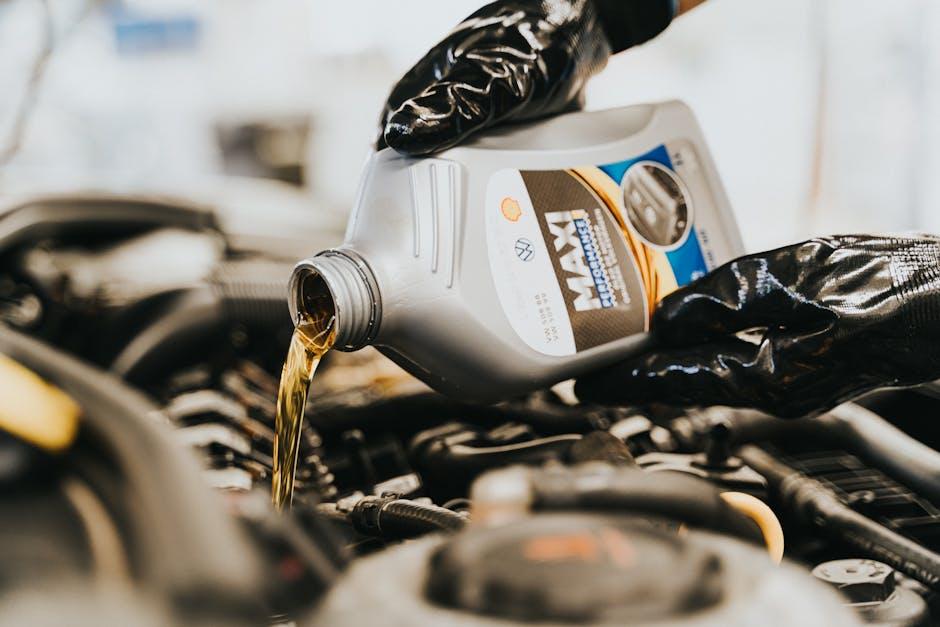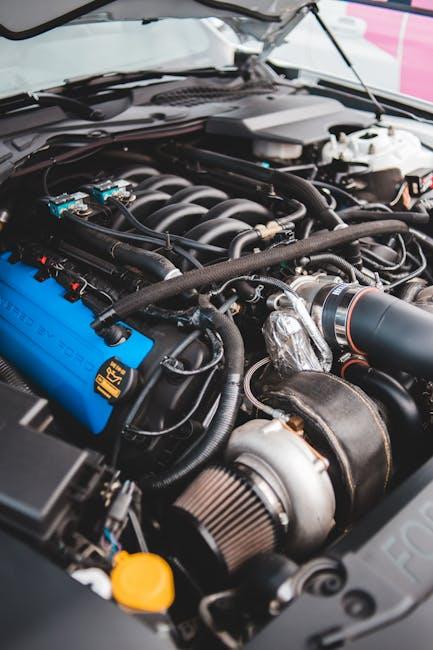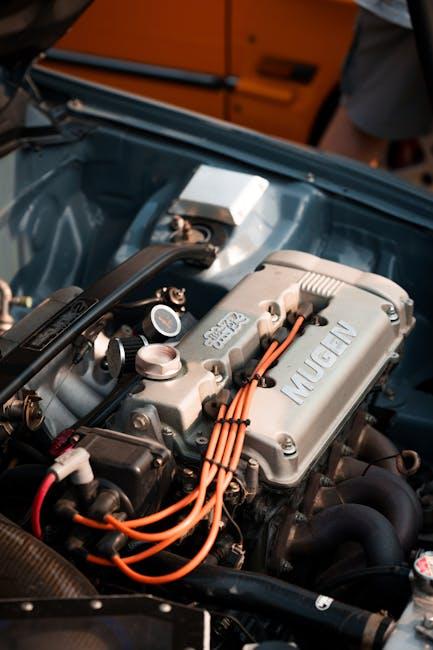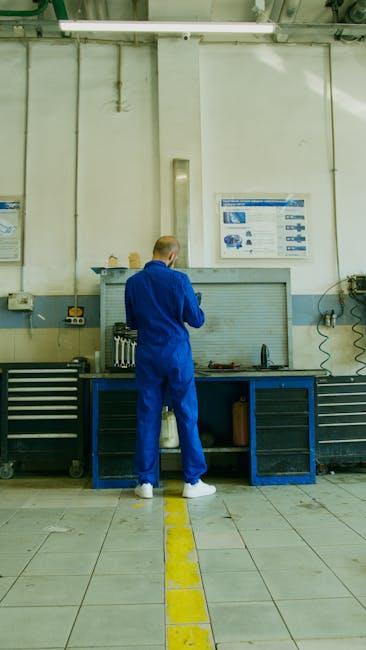A car engine is much like the heart of a finely tuned machine — vital, complex, and deserving of attentive care. Keeping it running smoothly requires more than just routine maintenance; it’s an art of understanding how each component works together to deliver performance, efficiency, and longevity. Whether you’re a seasoned driver or new to the world of automobiles, mastering the essentials of engine care can transform your driving experience, save costly repairs, and extend the life of your vehicle. In this article, we delve into practical tips and insightful strategies to help you maintain your car engine’s smooth operation, ensuring every journey starts and ends on the right note.
Table of Contents
- Understanding the Importance of Regular Oil Changes
- Choosing the Right Engine Coolant for Optimal Performance
- Tips for Maintaining Your Car’s Air Filter and Fuel System
- The Role of Spark Plugs in Engine Efficiency and How to Replace Them
- Signs Your Engine Needs Immediate Attention and How to Respond
- Incorporating Routine Inspections to Prevent Costly Engine Repairs
- Q&A
- Final Thoughts

Understanding the Importance of Regular Oil Changes
Regularly changing your car’s oil is more than just a routine chore—it’s a crucial maintenance step that keeps your engine healthy and efficient. Over time, engine oil breaks down and accumulates dirt, metal particles, and other contaminants that can cause wear and tear on vital engine parts. Fresh oil lubricates the engine components, reducing friction and preventing overheating, which in turn extends the lifespan of your vehicle. Ignoring oil changes can lead to sludge buildup, reduced fuel efficiency, and even costly engine damage.
To ensure your engine runs smoothly, consider these essential factors:
- Oil Type: Use the right grade as recommended by your manufacturer.
- Change Frequency: Follow the mileage or time intervals, typically every 3,000 to 7,500 miles.
- Oil Quality: Invest in high-quality synthetic or conventional oils depending on your driving habits.
| Oil Change Interval | Recommended Oil Type | Engine Benefit |
|---|---|---|
| Every 3,000 miles | Conventional | Basic protection, ideal for older engines |
| Every 5,000 miles | Synthetic Blend | Better protection & cleaner engine |
| Every 7,500 miles | Full Synthetic | Maximum performance & longevity |

Choosing the Right Engine Coolant for Optimal Performance
Selecting the appropriate engine coolant is not just about preventing overheating—it’s a critical step in maintaining your vehicle’s overall health and longevity. Modern coolants are formulated with specific additives that protect against corrosion, cavitation, and freezing, ensuring your engine remains chilled without suffering internal damage. When choosing, consider your car’s make and model, as well as the climate conditions where you usually drive. Opting for the wrong coolant can lead to inefficient heat transfer and costly repairs down the line.
To help you make an informed decision, here’s a quick guide to the most common types of engine coolants and their benefits:
- Inorganic Additive Technology (IAT): Traditional green coolant, perfect for older vehicles.
- Organic Acid Technology (OAT): Longer-lasting orange or red coolants designed for newer engines.
- Hybrid Organic Acid Technology (HOAT): Combines both IAT and OAT, often found in European vehicles.
| Coolant Type | Typical Color | Ideal For | Replacement Interval |
|---|---|---|---|
| IAT | Green | Older models | 2 years / 30,000 miles |
| OAT | Orange/Red | Modern vehicles | 5 years / 150,000 miles |
| HOAT | Yellow/Orange | European & some Asian cars | 5 years / 150,000 miles |

Tips for Maintaining Your Car’s Air Filter and Fuel System
Keeping your car’s air filter and fuel system in pristine condition is a cornerstone of engine longevity and performance. Start by inspecting the air filter every 12,000 to 15,000 miles or as recommended by your manufacturer. A clogged air filter restricts airflow, forcing your engine to work harder and burn more fuel. When replacing or cleaning, opt for quality filters designed to capture the finest particulates without compromising airflow. Equally important is clearing the fuel system of impurities; use a trusted fuel injector cleaner every 3,000 to 5,000 miles to dissolve deposits and maintain optimal spray patterns.
Establishing a routine checkup can make all the difference. Here are key maintenance tips for your filter and fuel system:
- Visual inspections: Look for dirt buildup or damage on your air filter.
- Fuel quality control: Always use premium or recommended fuel types to reduce contaminants.
- Scheduled cleanings: Use fuel additives to keep injectors clean and fuel flowing smoothly.
- Professional servicing: Have your fuel system flushed periodically for deep cleaning.
| Maintenance Item | Recommended Interval | Primary Benefit |
|---|---|---|
| Air Filter Replacement | Every 12,000 – 15,000 miles | Improved airflow & fuel efficiency |
| Fuel System Cleaner | Every 3,000 – 5,000 miles | Removes injector deposits |
| Fuel System Flush | Every 30,000 miles | Restores fuel flow & performance |

The Role of Spark Plugs in Engine Efficiency and How to Replace Them
Every engine relies on a precise spark to ignite the air-fuel mixture and keep the combustion process running smoothly. Spark plugs are the unsung heroes in this delicate dance, delivering the necessary electrical spark to initiate power strokes. When these components are in top condition, they ensure efficient fuel consumption, reduced emissions, and reliable performance. However, worn or dirty spark plugs can cause misfires, sluggish acceleration, and increased fuel usage, signaling it’s time for a replacement.
Replacing spark plugs is a straightforward maintenance task that can breathe new life into your engine. Before starting, gather the necessary tools: a spark plug socket, a ratchet, a gap gauge, and new plugs matching your vehicle’s specifications. Here’s a quick guide to the process:
- Disconnect the battery to ensure safety.
- Remove the spark plug wires or coil packs carefully to avoid damage.
- Use the spark plug socket to unscrew and remove the old plugs.
- Check the gap on new plugs with a gap gauge and adjust if necessary.
- Install the new plugs by hand initially, then tighten with the ratchet to the manufacturer’s torque.
- Reconnect the wires or coil packs securely before starting the engine.
| Common Signs of Bad Spark Plugs | Recommended Replacement Interval |
|---|---|
| Engine misfires or rough idle | Every 30,000 miles |
| Reduced fuel efficiency | Check during regular maintenance |
| Difficulty starting the engine | As needed based on symptoms |

Signs Your Engine Needs Immediate Attention and How to Respond
Recognizing critical engine signals early can prevent costly repairs and keep you safe on the road. Pay close attention to unusual engine noises such as knocking, ticking, or grinding, as these often indicate internal damage or impending failure. Also, if your car exhibits persistent stalling, hesitation during acceleration, or a noticeable drop in power, it’s a clear sign your engine may be struggling. Frequent or intense exhaust smoke, especially blue or white, can signal oil burning or coolant leaks, respectively, requiring immediate inspection. Dashboard warning lights, especially the check engine light, should never be ignored; they’re your vehicle’s way of alerting you to problems that need timely intervention.
When you notice these symptoms, act promptly by taking the following steps:
- Safely pull over: Reduce risk by stopping your vehicle in a safe spot away from traffic.
- Check basic fluids: Inspect oil and coolant levels as low fluids often cause or worsen engine problems.
- Avoid driving further: Continuing to drive can escalate damage; arrange for a tow if necessary.
- Consult a professional mechanic: Use trusted diagnostics to identify and address the root cause, not just the symptoms.
| Symptom | Possible Cause | Immediate Action |
|---|---|---|
| Engine knocking | Low-quality fuel or worn bearings | Stop driving, check fuel type, call mechanic |
| Strange exhaust smoke | Oil leak or coolant intrusion | Avoid driving, inspect fluid levels |
| Check engine light | Varied engine issues | Run diagnostic scan promptly |

Incorporating Routine Inspections to Prevent Costly Engine Repairs
Routine checks under the hood are more than just a habit—they’re a vital step in catching minor issues before they escalate into expensive engine repairs. By allocating time every few weeks to inspect key components, such as belts, hoses, and fluid levels, you establish a proactive defense against unexpected breakdowns. These inspections are your engine’s early warning system, helping you identify leaks, wear, and potential failures that could compromise performance or safety.
Incorporate a simple checklist into your maintenance routine to stay ahead:
- Check engine oil and coolant levels
- Inspect air and fuel filters
- Examine belts for cracking or fraying
- Look for signs of leaks on the engine block
- Listen for unusual noises during startup and idle
| Component | Inspection Frequency | Signs to Watch For |
|---|---|---|
| Engine Oil | Monthly | Low level, discoloration, sludge |
| Belts | Every 3 Months | Cracks, looseness, squealing |
| Coolant | Monthly | Low level, discoloration, leaks |
| Air Filter | Every 6 Months | Dirt buildup, restricted airflow |
Q&A
Q: What are the key habits to keep a car engine running smoothly?
A: Consistent maintenance is crucial. Regular oil changes, timely replacement of air and fuel filters, and using quality fuel all help your engine perform at its best. Think of your engine like a heartbeat—it needs clean oil and fresh fuel to keep steady.
Q: How often should I change my engine oil?
A: Generally, changing your oil every 3,000 to 5,000 miles keeps the engine lubricated and free from harmful debris. However, always check your car’s manual, as modern engines and synthetic oils may allow for longer intervals.
Q: Can neglecting the engine coolant affect smooth running?
A: Absolutely. Coolant prevents overheating, which can cause severe engine damage. Flushing and replacing coolant as recommended ensures your engine temperature stays in check, promoting a longer life.
Q: Why is maintaining the air filter important?
A: A clean air filter ensures the engine breathes easy, improving combustion efficiency. A clogged filter starves the engine of oxygen, leading to sluggish performance and increased emissions.
Q: How does fuel quality impact engine smoothness?
A: Using high-quality fuel helps prevent deposits in the fuel injectors and combustion chamber, promoting efficient burning and reducing engine knocking. Avoiding cheap or contaminated fuel is a simple way to protect your engine.
Q: What role does spark plug maintenance play?
A: Spark plugs ignite the fuel-air mixture inside the engine. Worn or dirty spark plugs can cause misfires, rough idling, and reduced fuel economy. Replacing them at recommended intervals keeps your engine firing on all cylinders.
Q: Are there driving habits that help maintain engine smoothness?
A: Yes! Avoid sudden accelerations and prolonged idling. Warm your engine up gently before pushing it to high speeds. Smooth driving habits reduce stress on engine components, leading to less wear and tear.
Q: How can I detect early signs my engine needs attention?
A: Listen for unusual noises like knocking or ticking, watch for warning lights, and notice any rough idling or decreased power. Addressing these signs promptly can prevent costly repairs down the road.
Q: Is professional servicing necessary if I regularly perform basic maintenance?
A: While basic upkeep is great, professional inspections catch issues that are easy to overlook. Mechanics can perform diagnostics, adjust timing, and check systems that keep your engine balanced and healthy.
Q: What’s the best mindset toward engine care?
A: Think of your engine as a finely tuned instrument—it thrives on regular care and attention. Preventive measures today build a smooth, reliable ride tomorrow. Staying proactive keeps your car humming happily for miles to come.
Final Thoughts
In the end, keeping your car engine running smoothly is less about occasional heroics and more about consistent care. Like a well-tuned instrument, your engine responds best to regular attention—clean filters, fresh oil, and mindful driving all play their part in the symphony of performance. By embracing these simple habits, you not only extend the life of your engine but also ensure every journey is a smooth, reliable one. After all, a smoothly running engine isn’t just about mechanics—it’s the quiet promise of adventure, waiting patiently beneath your hood.

11 Comments
Giao diện đẹp và dễ sử dụng là một trong những ưu điểm nổi bật của tài xỉu 66b. Với màu trắng và xanh biển tươi mát làm màu chủ đạo, làm cho giao diện của trang web rất dễ chịu và không nhàm chán.
Giao diện đẹp và dễ sử dụng là một trong những ưu điểm nổi bật của tài xỉu 66b. Với màu trắng và xanh biển tươi mát làm màu chủ đạo, làm cho giao diện của trang web rất dễ chịu và không nhàm chán.
Giao diện đẹp và dễ sử dụng là một trong những ưu điểm nổi bật của tài xỉu 66b. Với màu trắng và xanh biển tươi mát làm màu chủ đạo, làm cho giao diện của trang web rất dễ chịu và không nhàm chán.
Giao diện đẹp và dễ sử dụng là một trong những ưu điểm nổi bật của tài xỉu 66b. Với màu trắng và xanh biển tươi mát làm màu chủ đạo, làm cho giao diện của trang web rất dễ chịu và không nhàm chán.
Giao diện đẹp và dễ sử dụng là một trong những ưu điểm nổi bật của tài xỉu 66b. Với màu trắng và xanh biển tươi mát làm màu chủ đạo, làm cho giao diện của trang web rất dễ chịu và không nhàm chán.
Giao diện đẹp và dễ sử dụng là một trong những ưu điểm nổi bật của tài xỉu 66b. Với màu trắng và xanh biển tươi mát làm màu chủ đạo, làm cho giao diện của trang web rất dễ chịu và không nhàm chán.
Giao diện đẹp và dễ sử dụng là một trong những ưu điểm nổi bật của tài xỉu 66b. Với màu trắng và xanh biển tươi mát làm màu chủ đạo, làm cho giao diện của trang web rất dễ chịu và không nhàm chán.
Giao diện đẹp và dễ sử dụng là một trong những ưu điểm nổi bật của tài xỉu 66b. Với màu trắng và xanh biển tươi mát làm màu chủ đạo, làm cho giao diện của trang web rất dễ chịu và không nhàm chán.
Giao diện đẹp và dễ sử dụng là một trong những ưu điểm nổi bật của tài xỉu 66b. Với màu trắng và xanh biển tươi mát làm màu chủ đạo, làm cho giao diện của trang web rất dễ chịu và không nhàm chán.
Hey! I could have sworn I’ve been to this site before but after checking through some of the post I realized it’s new to me. Anyways, I’m definitely delighted I found it and I’ll be book-marking and checking back frequently!
**boostaro reviews**
Boostaro is a purpose-built wellness formula created for men who want to strengthen vitality, confidence, and everyday performance.